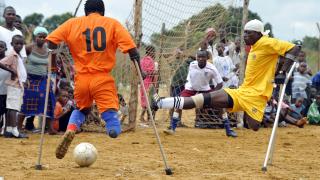
On the day of the opening ceremony of the 2012 Paralympic Games, UNA-UK's Executive Director, Phil Mulligan, wrote an article on the human rights legacy of the event.
Available on the Huffington Post UK website, the article looks at the contribution, already apparent in the lead-up to the Games, the Paralympics have made towards addressing steretypes and promoting positive images of disabled people as athletes and role models. It also seeks to analyse the wider impact of the event.
The Games are an opportunity to shine a light on the issue of disabled peoples’ rights more generally, particularly in the context of developing countries where many struggle to achieve basic equality of access, let alone the opportunity to participate at the top levels of sport.
Making disability rights a reality
UNA-UK fully supports the UN Convention on the Rights of Persons with Disabilities (CRPD) and Article 30, which reads: "States Parties shall take appropriate measures to encourage and promote the participation, to the fullest extent possible, of persons with disabilities in mainstream sporting activities at all levels".
Last week, UNA-UK wrote to the UK Minister for Disabled People calling for a lasting Paralympics legacy for people with disabilities in the UK. The letter also urged the government to reconsider the three reservations it has made to the Convention.
Click here to read a letter sent to the UK Minister for Disabled People on the Convention
Click here to read about our ongoing campaign on the CRPD
Using sport to promote rights
On 29 August, UNA-UK's Natalie Samarasinghe attended the launch of a Joint Communiqué agreed by the UK, Brazil (host of the 2016 Summer Games), Russia (host of the 2014 Winter Games) and South Korea (host of the 2018 Winter Games). The Communiqué commits each of these countries to harness the potential of sport, through the Olympic and Paralympic Games, to promote respect for human rights internationally.
Introducing the Communiqué, FCO Minister Jeremy Browne said:
"Sport can be a hugely effective driver for change. It promotes inclusivity, bringing people together to interact, co-operate and strive to achieve common goals. It can reach out to a diverse cross-section of society and connect and integrate people, regardless of background. Just think of how football has changed attitudes towards race in Britain over the last few decades ... Think of how the Paralympic Games have showcased to a global audience the achievements of disabled people – demonstrating that we should all be judged not by what we cannot do, but what we can."
Speaking at the launch, Paralympian Tara Flood, whose 1992 world record in 50m breastroke stood for nearly 20 years, expressed hope that future coverage of the Games would focus squarely on the sporting feats of these elite athletes. Flood, who is Chief Executive of the Alliance for Inclusive Education, said that stories of disabled people should not be about triumph over tragedy, but rather their achievements.






